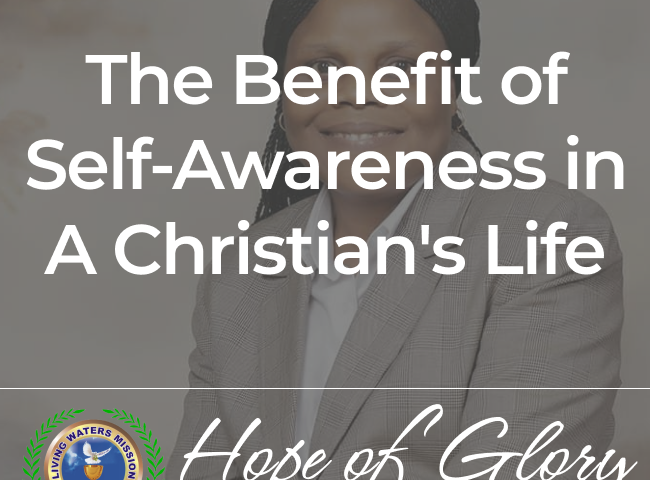- For Further Enquiries:
- +234 803 398 2694
- +234 706 664 6220
- info@livingwatersmission.org

GOD IS GOOD, ALL THE TIME
November 1, 2023
A GRAND ENTRY INTO THE NEW YEAR – PREPARING MENTALLY AND SPIRITUALLY FOR A BLESSED YEAR-END AND NEW YEAR
November 11, 20235th NOVEMBER 2023
“Anyone who listens to the word but does not do what it says is like someone who looks at his face in a mirror and, after looking at himself, goes away and immediately forgets what he looks like. But whoever looks intently into the perfect law that gives freedom and continues in it—not forgetting what they have heard but doing it—they will be blessed in what they do.” – James 1:23-25
What kind of a person are you, and how much do you understand yourself? Do you have a negative or a positive mindset? How mindful are you about life generally?
Self-awareness is a powerful tool that allows individuals to understand themselves on a deeper level. As Christians, self-awareness plays a significant role in our spiritual growth and relationship with God. By examining our thoughts, emotions, and actions through the lens of God’s Word, we can gain insight into our strengths, weaknesses, and areas in need of transformation. This devotional will explore the benefits of self-awareness in a Christian’s life and provide guidance on how to cultivate it.
1. Recognizing Our Need for Salvation
Self-awareness begins with recognizing our need for salvation. The Bible teaches us that all have sinned and fall short of the glory of God (Romans 3:23). When we become aware of our sinful nature, we realize our desperate need for a Savior. This awareness leads us to repentance and acceptance of Jesus Christ as our Lord and Savior (Acts 2:38). Through self-awareness, we acknowledge our need for God’s grace and mercy, which brings about true transformation in our lives.
2. Identifying Areas for Growth
Self-awareness enables us to identify areas in our lives that require growth and refinement. As Christians, we are called to conform to the image of Christ (Romans 8:29). By examining ourselves honestly, we can identify patterns of behavior or attitudes that do not align with God’s Word. This process allows us to surrender these areas to God and seek His guidance for transformation (Psalm 139:23-24). Through self-awareness, we invite the Holy Spirit to work within us, molding us into vessels that bring glory to God.
3. Cultivating HumilitySelf-awareness fosters humility within us. When we recognize our own weaknesses and limitations, we are less likely to rely on our own strength and more inclined to depend on God (Proverbs 3:5-6). The Apostle Paul exemplified this humility when he acknowledged his weaknesses, stating, “But he said to me, ‘My grace is sufficient for you, for my power is made perfect in weakness.’ Therefore I will boast all the more gladly about my weaknesses, so that Christ’s power may rest on me” (2 Corinthians 12:9). Through self-awareness, we learn to rely on God’s strength rather than our own, allowing His power to be manifested in our lives.
4. Enhancing Relationships:Self-awareness also plays a crucial role in our relationships with others. By understanding our own emotions, triggers, and communication styles, we can navigate relationships with greater empathy and compassion. Jesus taught us the importance of loving others as ourselves (Mark 12:31). When we are self-aware, we can extend grace and forgiveness to others because we recognize our own need for these gifts. Self-awareness helps us build healthier and more authentic connections with fellow believers and non-believers alike.
5. Deepening Intimacy with God
Ultimately, self-awareness leads us to a deeper intimacy with God. As we become more aware of our thoughts, motives, and desires, we can bring them before God in prayer (Psalm 139:23-24). Through self-reflection and examination of our hearts, we invite the Holy Spirit to reveal areas where we need His guidance and transformation. This process allows us to draw closer to God, aligning our will with His and experiencing His love and presence in a profound way.
Beloved in Christ, the Lord calls us today to recognize our limitations and surrender to God’s wisdom. We must acknowledge our flaws and weaknesses while relying on God’s strength to overcome them. Through prayer, meditation, and seeking divine guidance, we can cultivate self-awareness in alignment with God’s purpose for our lives.The word of God today compares self-awareness to looking at oneself in a mirror. It emphasizes the importance of not only observing oneself but also taking action based on what is revealed. Self-awareness without action is futile; it requires a commitment to align one’s thoughts, words, and actions with God’s teachings in other to derive the ultimate benefits of allowing God to manifest His plan and purpose for our lives.
PRAYER
Father in the name of Jesus Christ, I thank you for the word of faith today. Grant that your holy word will find a fertile ground to grow in my heart. AMEN
FURTHER READING: Proverbs 20:27, Proverbs 20:27
THE BENEFIT OF SELF-AWARENESS IN A CHRISTIAN’S LIFE
5th NOVEMBER 2023
“Anyone who listens to the word but does not do what it says is like someone who looks at his face in a mirror and, after looking at himself, goes away and immediately forgets what he looks like. But whoever looks intently into the perfect law that gives freedom and continues in it—not forgetting what they have heard but doing it—they will be blessed in what they do.” – James 1:23-25
What kind of a person are you, and how much do you understand yourself? Do you have a negative or a positive mindset? How mindful are you about life generally?
Self-awareness is a powerful tool that allows individuals to understand themselves on a deeper level. As Christians, self-awareness plays a significant role in our spiritual growth and relationship with God. By examining our thoughts, emotions, and actions through the lens of God’s Word, we can gain insight into our strengths, weaknesses, and areas in need of transformation. This devotional will explore the benefits of self-awareness in a Christian’s life and provide guidance on how to cultivate it.
1. Recognizing Our Need for Salvation
Self-awareness begins with recognizing our need for salvation. The Bible teaches us that all have sinned and fall short of the glory of God (Romans 3:23). When we become aware of our sinful nature, we realize our desperate need for a Savior. This awareness leads us to repentance and acceptance of Jesus Christ as our Lord and Savior (Acts 2:38). Through self-awareness, we acknowledge our need for God’s grace and mercy, which brings about true transformation in our lives.
2. Identifying Areas for Growth
Self-awareness enables us to identify areas in our lives that require growth and refinement. As Christians, we are called to conform to the image of Christ (Romans 8:29). By examining ourselves honestly, we can identify patterns of behavior or attitudes that do not align with God’s Word. This process allows us to surrender these areas to God and seek His guidance for transformation (Psalm 139:23-24). Through self-awareness, we invite the Holy Spirit to work within us, molding us into vessels that bring glory to God.
3. Cultivating HumilitySelf-awareness fosters humility within us. When we recognize our own weaknesses and limitations, we are less likely to rely on our own strength and more inclined to depend on God (Proverbs 3:5-6). The Apostle Paul exemplified this humility when he acknowledged his weaknesses, stating, “But he said to me, ‘My grace is sufficient for you, for my power is made perfect in weakness.’ Therefore I will boast all the more gladly about my weaknesses, so that Christ’s power may rest on me” (2 Corinthians 12:9). Through self-awareness, we learn to rely on God’s strength rather than our own, allowing His power to be manifested in our lives.
4. Enhancing Relationships:Self-awareness also plays a crucial role in our relationships with others. By understanding our own emotions, triggers, and communication styles, we can navigate relationships with greater empathy and compassion. Jesus taught us the importance of loving others as ourselves (Mark 12:31). When we are self-aware, we can extend grace and forgiveness to others because we recognize our own need for these gifts. Self-awareness helps us build healthier and more authentic connections with fellow believers and non-believers alike.
5. Deepening Intimacy with God
Ultimately, self-awareness leads us to a deeper intimacy with God. As we become more aware of our thoughts, motives, and desires, we can bring them before God in prayer (Psalm 139:23-24). Through self-reflection and examination of our hearts, we invite the Holy Spirit to reveal areas where we need His guidance and transformation. This process allows us to draw closer to God, aligning our will with His and experiencing His love and presence in a profound way.
Beloved in Christ, the Lord calls us today to recognize our limitations and surrender to God’s wisdom. We must acknowledge our flaws and weaknesses while relying on God’s strength to overcome them. Through prayer, meditation, and seeking divine guidance, we can cultivate self-awareness in alignment with God’s purpose for our lives.The word of God today compares self-awareness to looking at oneself in a mirror. It emphasizes the importance of not only observing oneself but also taking action based on what is revealed. Self-awareness without action is futile; it requires a commitment to align one’s thoughts, words, and actions with God’s teachings in other to derive the ultimate benefits of allowing God to manifest His plan and purpose for our lives.
PRAYER
Father in the name of Jesus Christ, I thank you for the word of faith today. Grant that your holy word will find a fertile ground to grow in my heart. AMEN
FURTHER READING: Proverbs 20:27, Proverbs 20:27






